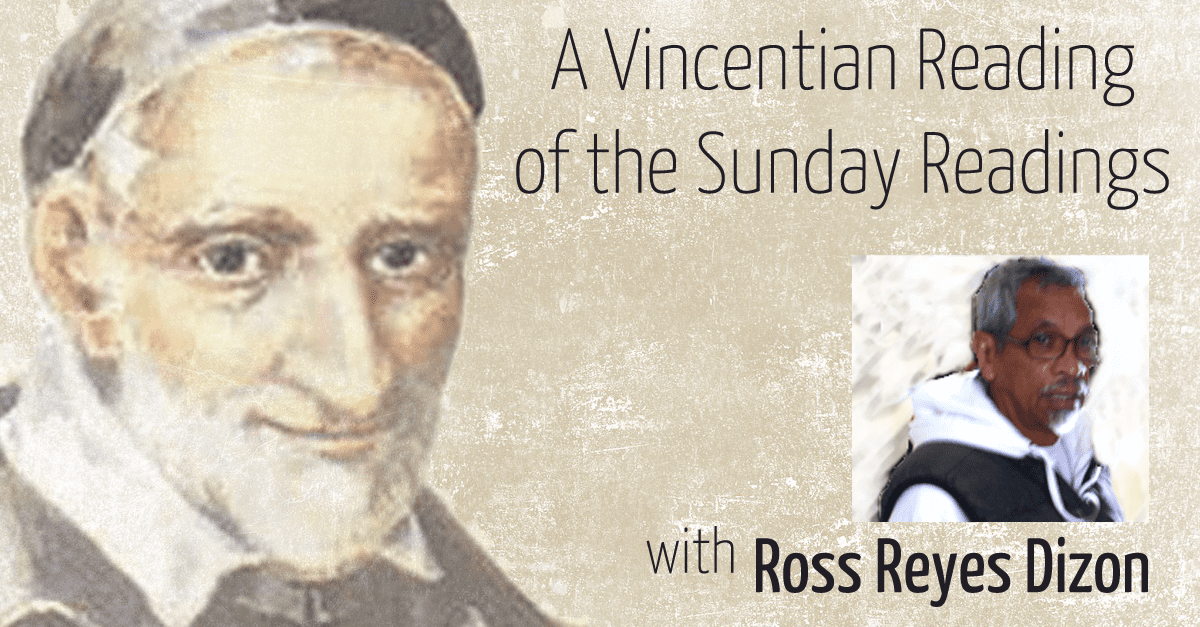Jesus is constitutive of the Christian community. Do we say and live this as St. Vincent?
Moises makes clear what truly matters. Jesus does so too. For the two of them, it is not about us. Or the group that we make up, chosen and gifted so as to serve others. Rather, it is about the one who sets us apart to make us his people. He constitutes us as his own in a striking way (Dt 7, 6; 14, 2; Tit 2; 1 Pt 2, 9). In other words, he is constitutive of the new People of God.
On Mount Sinai, yes, he gives the Law through Moises. This is the what is constitutive of the people of Israel. And Jesus goes up the mountain, and it is there that grace and truth come to us through him. The new Moses sets before us the beatitudes as the constitution, the supreme, fundamental, foundational law of God’s people.
And Jesus lets us know that the kingdom he brings in is not just another one of so many in the world. For the blessed in God’s kingdom are the accursed in world.
That is to say, the lucky ones in the kingdoms of the world are those who show power, sparkle, wealth, raw strength. Those who, proud and wicked, do so well (Ps 73). “For they have no pains; their bodies are sound and sleek. They share in no sorrows; they are not stricken like others.” And that is why so many turn to them and drink in all their words (see also Ps 49, 19).
Constitutive of the kingdom of God
But God turns away those that the world acclaims. For they have yet to pierce his mysteries. No one has taught them that life is short (Ps 49, 13; 90, 12; Lk 12, 20). And they have not learned that constitutive of it is drudgery (Ps 90, 10; Jb 7, 1).
The world sees the appearance, but God does not (1 Sam 16, 7). He does not judge by it nor decides by hearsay; he seeks justice for the little ones (Is 11, 3-4).
What is constitutive of God’s kingdom states also that blessed are such lowly and meek folks, these ones that mourn. And hunger and thirst for justice, show mercy, and work for justice and peace. Those, too, who, for such work, go through abuse, slander, beatings. That is to say, they suffer because their feet “are beautiful upon the mountains”; they bring good tidings. Since they go with Jesus who fulfills the Law and the prophets, and also embodies the beatitudes.
The beatitudes, then, are not abstract principles. They point to Jesus. And to the poor, of flesh and blood, who keep the true religion (SV.EN XI:190). They “have nothing but their faith,” and each other; they see they are the ones who need God and communion most (see Shifting).
So, it is clear what to be cast in the constitutive mold of God’s kingdom means. It is to embrace Jesus and the least of his brothers and sisters. They, their love, are constitutive, the Rule, of who we are and of what we do (SV.EN XII:110). That is why they are above all rules (SV.EN X:478). Such love, besides, is so creative that it feeds us with Christ’s body and blood and drives us to the poor (SV.EN XI:131; CCC 1397).
Lord Jesus, we say that you are constitutive of our mission. Grant that, through us, Zion’s poor be filled with bread and its priests clothed with blessing (Ps 132, 15-16).
27 September 2021
St. Vincent de Paul
Is 52, 7-10; 1 Cor 1, 26 – 2, 2; Mt 5, 1-12a








0 Comments